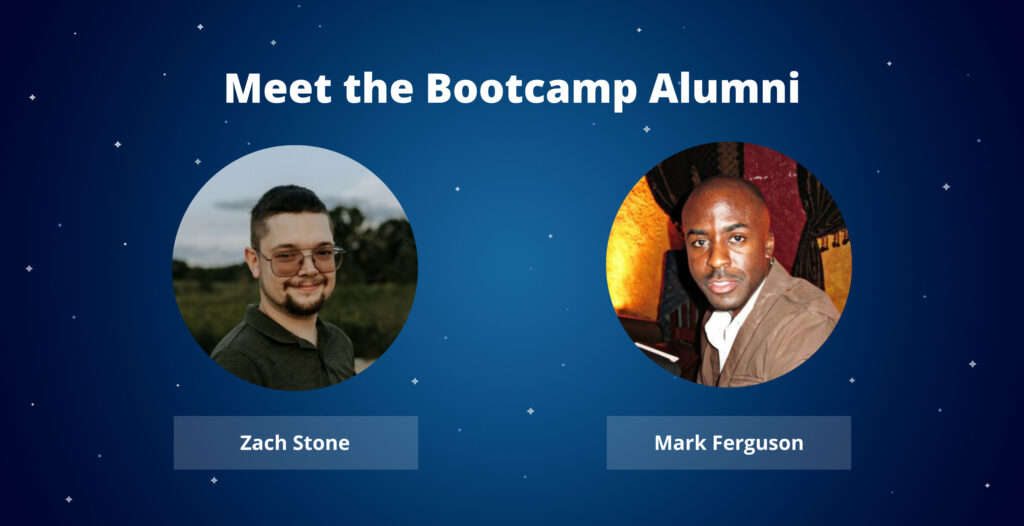Coding Bootcamp Alumni Share The Best Ways to Avoid Burnout

With programs that can sometimes require 80 hours of commitment a week (and undivided attention either online or in-person), there’s no doubt a coding bootcamp tends to overwhelm students and in some cases, cause burnout.
We had the opportunity to talk with some bootcamp alumni about how they battled burnout and what advice they have for new students just getting started.

What was the most challenging moment of your bootcamp and how did you overcome it?
Zach:
The most challenging moment of my bootcamp was when my first was born in the middle of my final project. The lack of sleep and the stress of making sure I finished the bootcamp well, was crushing. I overcame this and learned a valuable lesson about communicating your needs quickly, by sharing with my mentor where I was. In the end, she was able to support me and help me complete the bootcamp. I am grateful for the ability to share struggles in the dev community, and even to this day, I see others work together as a team and pitch in.
Mark:
Presenting my first major project to an audience of course mentors and my peers. I was nervous about this because it was the first test of my understanding of the standard machine learning algorithms, as well as model selection, scoring, and evaluation. Afterward, I had to answer questions on my workflow, findings, and the key decisions I made during the project. My main tool in overcoming this challenge was thorough preparation, including making sure I had fully understood the limitations of my approach and of the dataset that I was working with.
What was your most rewarding experience?
Zach:
Interestingly enough, the most challenging and the most rewarding are one and the same. With my daughter being a newborn, and me working hard to meet the deadline for my final project to complete the bootcamp, came a sweet realization of why I was pursuing this career to begin with. To provide for my family. I have a sweet video of me holding my daughter in my arms, while I was talking out loud when I was coding. In the video, I am explaining what a loop is to her.
Mark:
There was a prep course that every student had to complete before being able to enroll in the full Data Science bootcamp, and at the end of the prep course, there was a mini-project. Completing that project and receiving positive feedback on the quality of my analysis was huge for me because it validated my decision to enter what was an entirely new field for me.
What tips or advice do you have for students to help avoid burnout while in a coding bootcamp?
Zach:
This tip also applies to the job force as well. It’s a process I came up with under the guidance of others.
First off, timebox yourself. If you are not getting momentum, and you are spinning your wheels for more than 15 mins, take a break. Go for a walk. Or if you are completely lost, ask for help from another dev.
After timeboxing, if you are feeling overwhelmed by the sheer magnitude of the tasks at hand. Stop. Take a moment, and break down the task into smaller goals. I remember vividly, in college syllabus week always made students panic.
The saying “how do you eat an elephant? One bite at a time” was told to me by my father. I thought it was strange to eat an elephant, so instead, I thought of syllabus week like seeing on one massive table all of the meals you would eat for the semester. You could look at the table and think “There is no way I can eat that much!” But when you take it, one meal at a time, it’s much more manageable. Learning how to break down a big task into smaller pieces is a skill you will refine over time.
If you are still finding you are feeling in over your head, reach out to someone to help you understand a concept or a requirement you aren’t able to understand.
Bonus tip:
Learn how to ask for help well. As a Jr, it’s tempting and easy to just throw in the towel and say “I don’t get this!” and not explain anything further. This makes a seasoned developer have to backtrack and ask a bunch of questions to even begin to understand how to help you. If you want to save your time, and theirs, write out your questions first.
Guides to ask for help well:
Explain what you THINK the requirements are.
Explain what you THINK the solution may or may not be.
Explain what you ALREADY tried.
Point to the concepts or terminology you don’t understand.
Share the file location, the file name, and a code snippet.
Mark:
I found that I worked most productively and effectively in short bursts. Coding can be very mentally taxing and is strangely addictive when you get absorbed in a problem. But the human mind loses efficiency the longer you work, so you have to take frequent breaks to optimize performance. Along the same lines, having hobbies helped me to relieve stress and clear my mind.
Know when to call it a day or night. Many times I solved a problem easily within the first few minutes of the morning, having puzzled over it for hours the previous night. It sounds counterintuitive to leave problems unsolved, but your subconscious mind will do a lot of the work for you if you let it.
Practice a good diet and exercise, and get enough sleep. Late nights and project work will reveal any flaws in your lifestyle.


